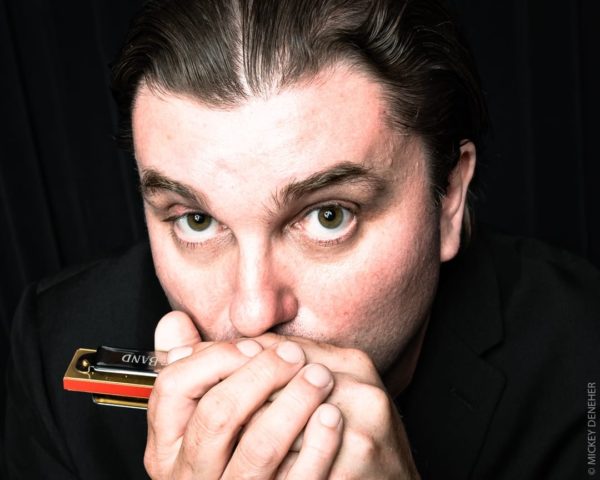
Dating back to the late 1800s, the blues have set a musical foundation for many to grow on. From Memphis to Chicago, and Leadbelly to B.B., a great debt is owed to those 12 bars. Giles Robson is just one of those musicians who has drawn from this enduring musical genre. Originally from Jersey in the Channel Islands (a British Crown dependency) and now living in France, he is a Blues Foundation Blues Award winner and the first British or European artist to appear on the prestigious Alligator Records blues label. I had the opportunity to sit down with this harmonica-touting blues man recently as the New Year began, after he wrapped up a 5-day promotional showcase introducing himself to the U.S. – a tour that included his debut American performance at the Colony, in Woodstock, NY.
A disciple of the blues, his beliefs are straightforward, “I am under the opinion that the blues is the most incredible, communicative music in the world. So simple, yet it has so much feeling. I feel fortunate I fell in love with it and progressed in it.”
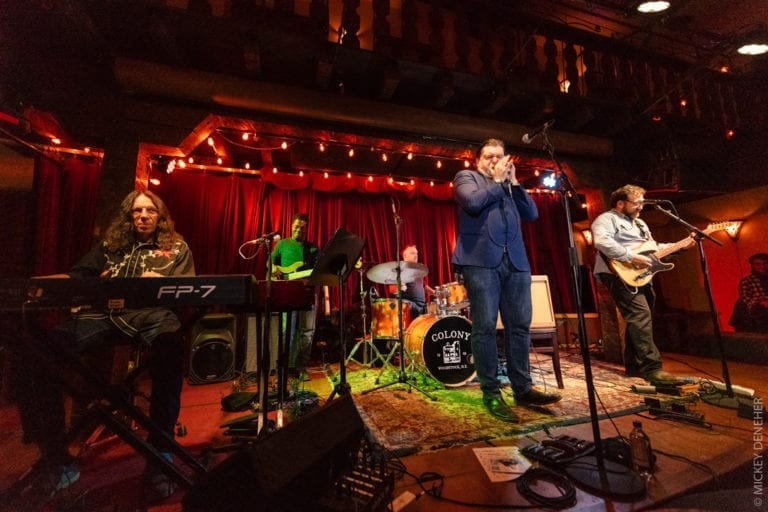
His journey into music started with the violin at age seven, then on to the saxophone three years later “because I watched a lot of old movies when I was ten or eleven year old,” Robson shares. “They always had the big bands, and I really fell in love with the swing horn lines.” While on a school art trip to Spain, he picked up his first blues harp. “I (had) heard it on the theme tune to Roseanne, a guy named John “Juke” Logan, and I heard Will Smith play it on the Fresh Prince of Bel-Air. I was intrigued by it. When I got back to Jersey, it just so happened that there was an African-American harmonica and guitar duo, Cephas and Wiggins, playing within a week of getting back. My parents sent me to see them and the rest is history. I just got hooked.”
Formal training helped prepare Giles for his foray into the blues. “My sax teacher was an acid jazz player and got me playing Charlie Parker heads (challenging melodies) and showed me the basics of improvisation. So when I started playing harp, I had that little bit of knowledge to help me out.” When it came to learning the harmonica, “I was teaching myself,” Giles divulges, “I would pretend I was a member of the Muddy Waters band and I would play the same solo along with the record, over and over again. “
I am under the opinion that the blues is the most incredible, communicative music in the world. So simple, yet it has so much feeling.
Giles Robson
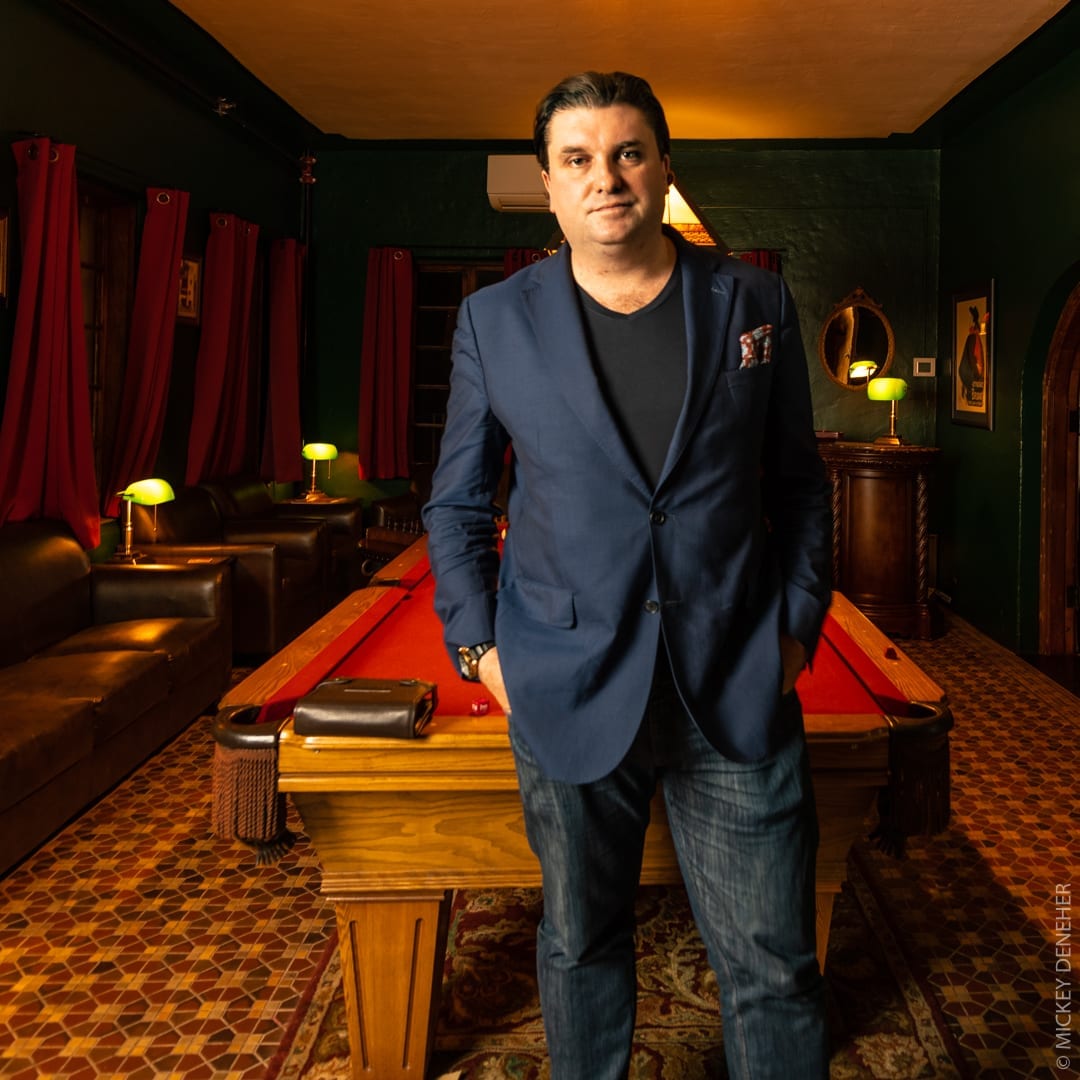
His efforts took hold and in 2007 Giles Robson and The Dirty Aces stepped onto the European music scene, receiving praise in the UK press. “That was an interesting band,” he notes. “I was trying to do a crossover with lots of different elements in it. I was trying to be as original as possible. But I realized my strength was in doing the blues, the pure blues with a little twist. I was getting too rock for blues and too blues for rock. It showed me what can and cannot work. “
After three recordings with The Dirty Aces, Robson signed with V2 Records in Holland. Now a solo artist, For Those Who Need the Blues was later made. “ We recorded that album in six hours. This was my return to the pure blues,” he professes. With a new record in hand, he was booked at an upcoming festival in Holland under the name Giles Robson and The Dirty Aces. “They were expecting this garage rock. I went over with the band I had just recorded with and did the pure blues. The people went crazy. From that moment on things changed around for me.”
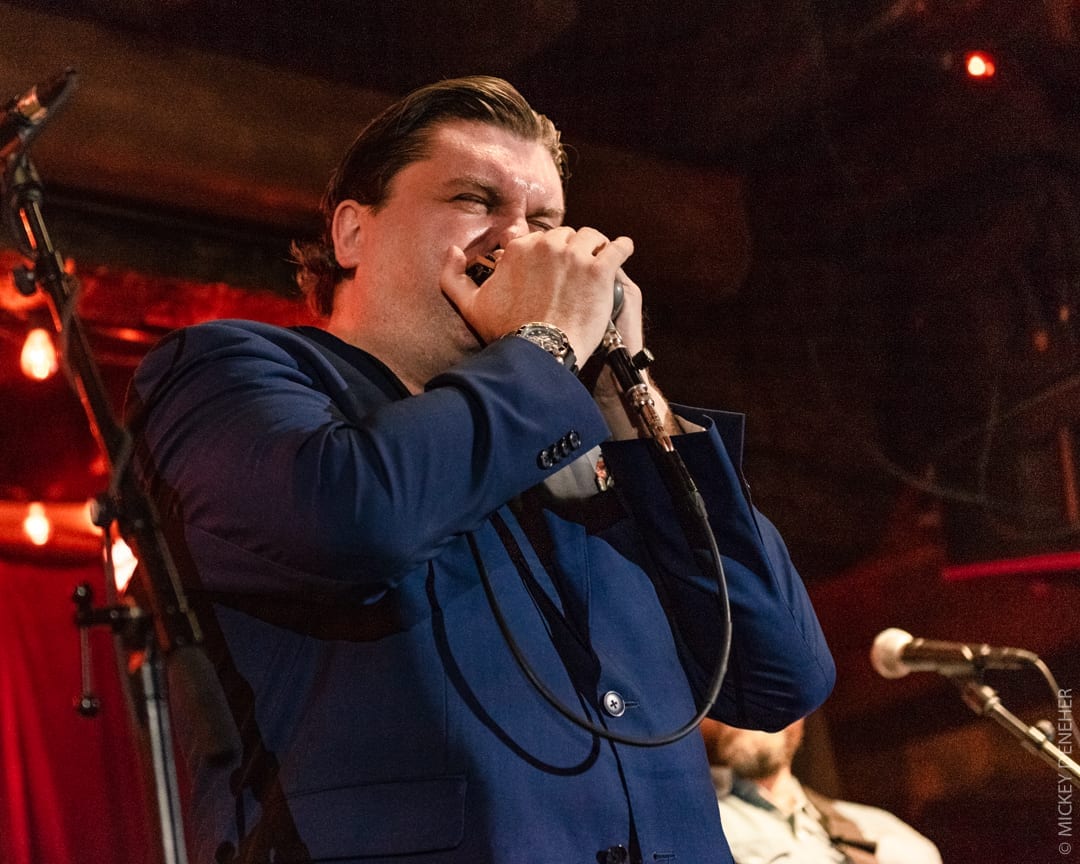
Reflecting on that moment of musical purification, “The blues is always there, and it needs to be. I met a lot of people on this (current) tour that told me that they got into this music as they got older. Once you get to 40, you’ve probably been through several life events that the blues tackle. Divorce. Relationships. When you’re in your early twenties, pop music works because you’ve not been through any of that heartbreak and such. When you get older you’ve been through it. It’s not a shallow thing. You can’t help but think about things in your life that blues sings about.”
In December 2017, while performing at a festival in Europe, Robson crossed paths with Grammy-nominated, W.C. Handy Award-winning blues guitarist Joe Louis Walker. Walker saw his performance earlier that day and invited him up to jam during his set. “We got on musically very well. Then we talked for hours after the show about lots of blues music,” Giles recalls. A few months later while touring around Europe and listening to acoustic blues while traveling between shows, Robson started thinking, “I’d love to do an album with someone who could really do this (acoustic blues) music justice, and then the idea came, it was Joe. ”
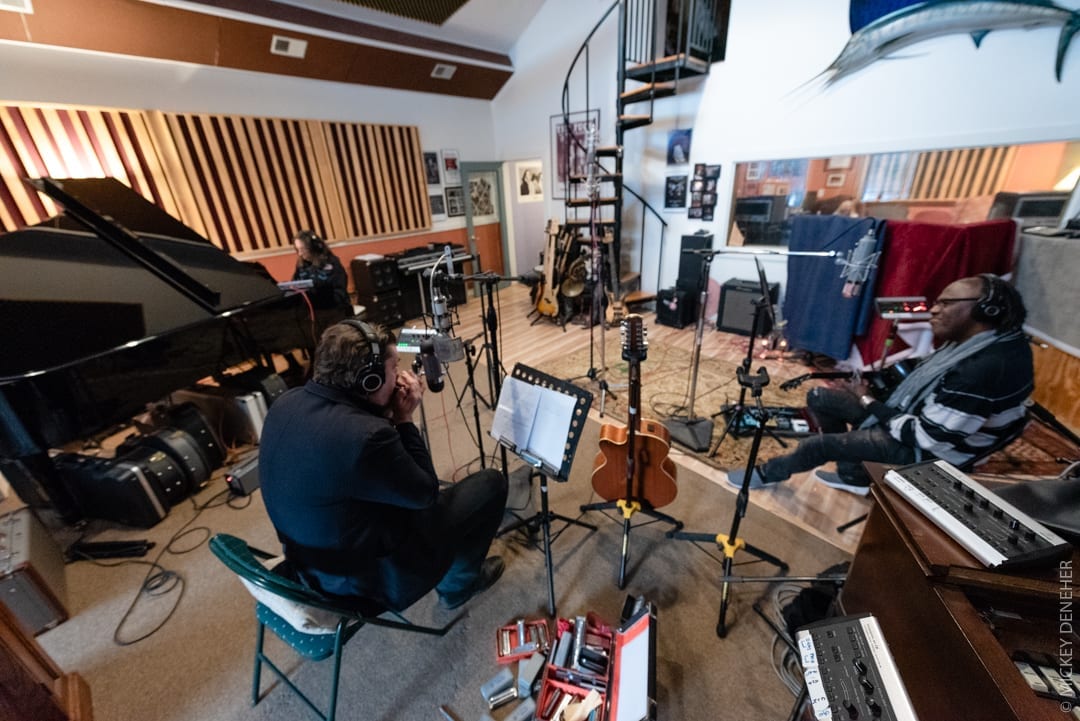
“I wanted to hear his voice, which is one of the most incredible voices in the blues,” Robson declares. “I wanted to hear his voice without a band behind him, in an intimate situation. I wanted my harmonica next to that voice. I contacted him and he was very keen on it. It was a beautiful experience.” Journey To The Heart Of The Blues was the end result of this homage to acoustic blues, garnishing a 2019 Acoustic Album of the Year Blues Music Award. Bruce Katz (Gregg Allman, Ronnie Earl, Delbert McClinton, John Hammond,) joined the pair on piano for the recording sessions. “Joe brought Bruce in, an excellent sort of foil for the music. He is a funky player, but has this level of finesse that gave it an extra depth and added synergy in the studio.” Alligator Records picked up the album and it was tracked and mixed at NRS Recording in Catskill, NY for distribution in the U.S.
I was teaching myself … I would pretend I was a member of the Muddy Waters band and I would play the same solo along with the record, over and over again.
Giles Robson on learning to play the harmonica
“The beauty of the blues,” Giles lauds, “is the people already know the chord changes. They are really familiar with it and you put in your own individual harmonica style, or song style, or lyrics. It’s a magical thing. Sometimes musicians lose their way with the music because the technical ego takes over. They say on something as simple as that, I have to do something more complicated. As you get older, it becomes a lot easier to be naturally simple. Just do what is able.”
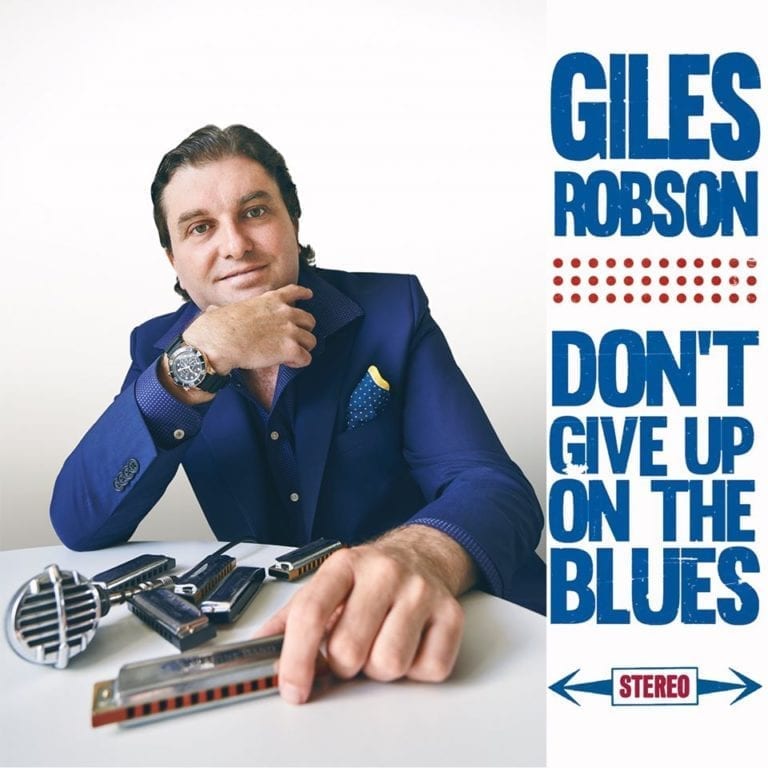
His latest recording, Don’t Give Up On The Blues, which came out late September 2019, is a shift from Journey to the Heart of the Blues. Robson puts it this way, “I wanted to do original songs with blues structures. We’ve got original riffs in there, but we wanted to respect the structure and rhythm of the blues.” Capitalizing on their previous success, Bruce Katz joined on for this project. “Bruce is incredibly versed in the traditions of the piano.” Expanding on the approach to the album, “We didn’t use an out and out traditional guitar player or traditional bass player. We didn’t want to be too fussy about it. It is an album that has both the traditional and a splash of dirty.”
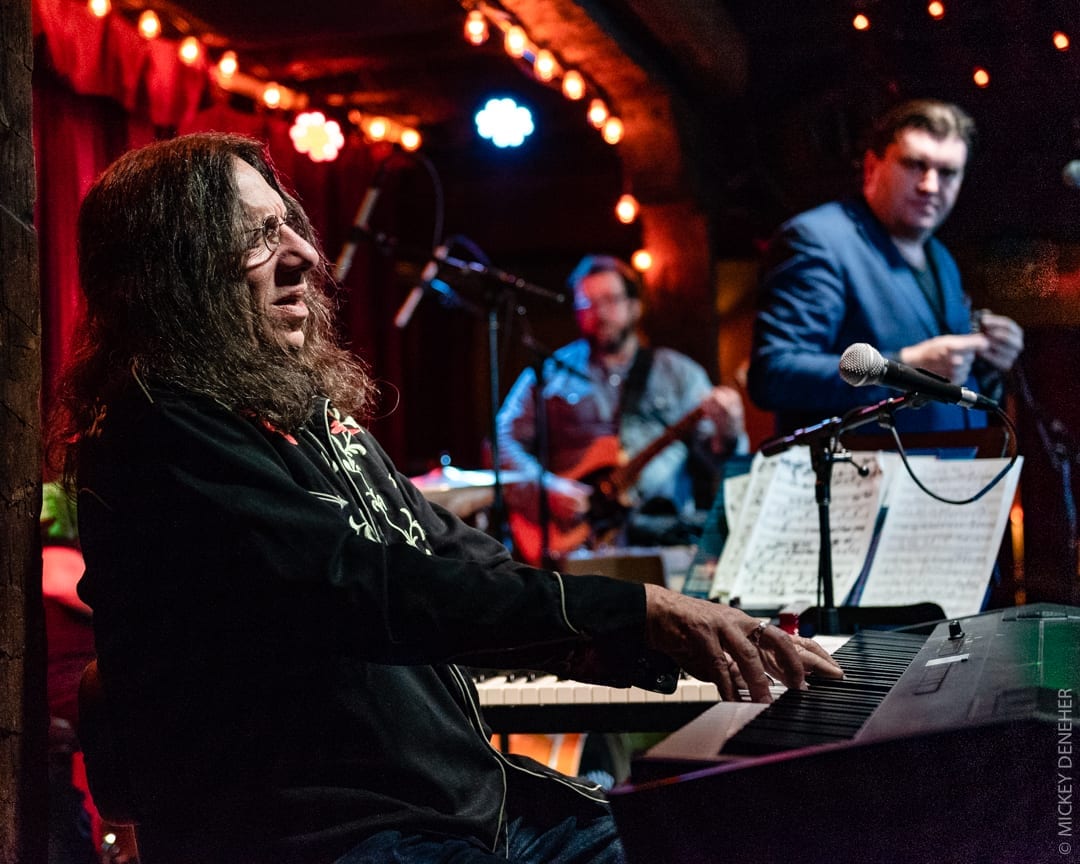
As part of the Robson’s showcase tour, Don’t Give Up On The Blues was presented front and center. Backed by Bruce Katz on keyboards, Aaron Lieberman on guitar, Ray Hangen on drums, Antar Goodwin on bass, (who all played on the album) and joined by special guest vocalist Katie Henry, Giles and crew showed why this latest recording has been called, “Retro. Timeless with an edge of modernity so the sound is relevant and fresh today,” by the UK’s Bluesdoodles.com. I attended the Colony show in Woodstock, NY, where the music expanded and contracted throughout the set, allowing each song the opportunity to offer it’s own blues narrative. As the New Year begins, Don’t give up on the Blues continues to chart high on American and European blues radio.
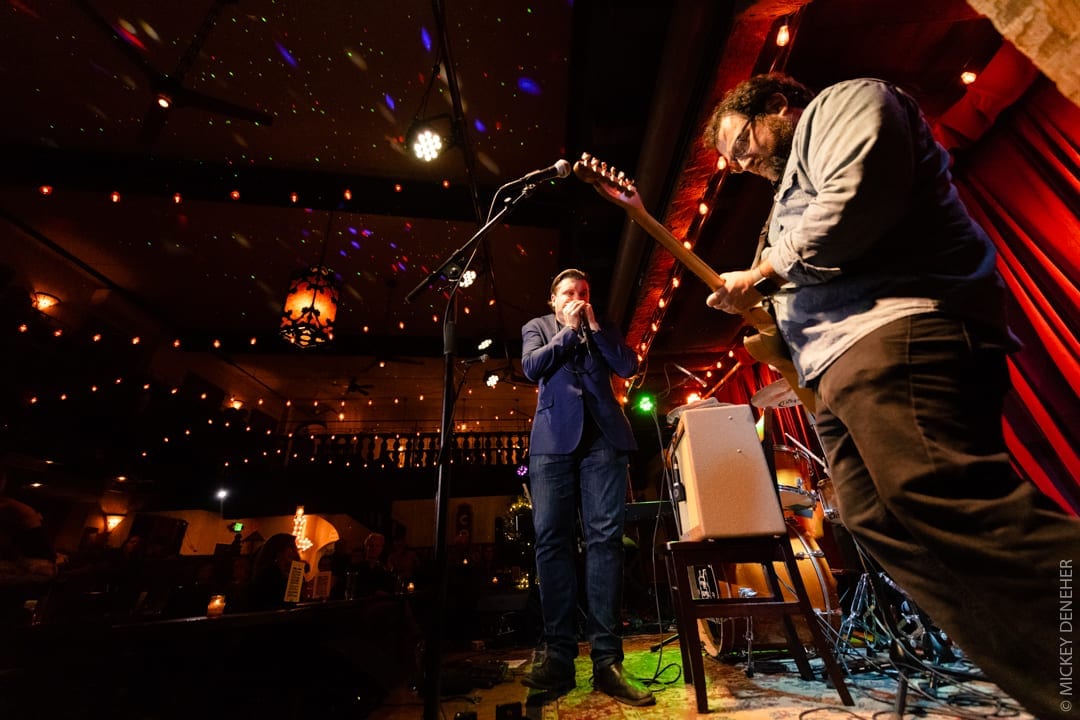
When it comes to blues harp influences, Giles points to the Chicago players. “All of them,” he says. “Everyone has their own distinct style. Some are very simple but still captivating. Some are very technically advanced and still captivating. They all had feeling and emotion. It’s pretty miraculous what they did with the instrument. The two main guys were Little Walter and Sonny Boy Williamson for me. I listen to them almost on a daily basis. “
The blues are based in suffering and heartache, but for Robson’s blues, 2020 is looking bright. A new record getting global recognition combined with a touring schedule filled with club and festival dates across the US and Europe, it will be hard to find a downside for this rising blues man. Perchance you run into Giles out on the musical highway, take a moment and imagine you’re both in a James Bond movie. “How would you like your blues, Mr. Robson?” “Pure. Not stirred.”